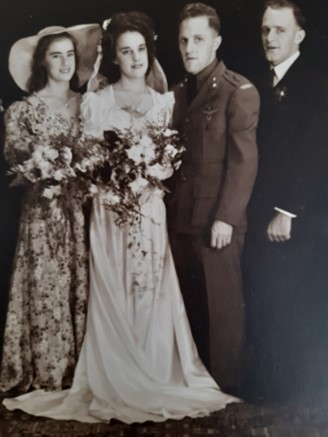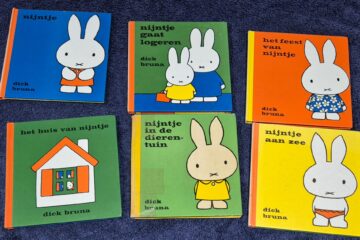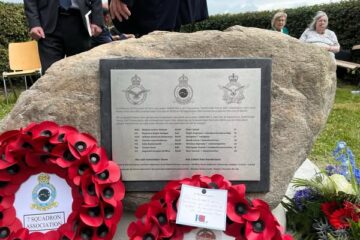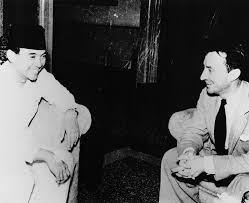Our mother met a Dutch pilot during the war. His name was Fredrik (Pulk) Pelder and there are many mentions of his heroics on the World Wide web. One instance in particular that was widely publicised, was an escape from Java where Fred and Mendizabal (Canadian), Sgt Stuart Munroe (Australian), Alan Martin (Australian) and Doug Jones (New Zealander) found a number of abandoned (and heavily damaged) Lockheed 12’s on the Pameungpeuk airstrip. Pelder had trained on these aircraft and knew how to fly them and the five of them started to repair one of the Lockheeds. They had no tools but somehow managed to replace a complete tail section, using coins as screwdrivers. The island of Ceylon was way beyond the fuel range of the L-12, but the inventive quintet had brought a number of fuel filled wine casks aboard. They had cut a hole in the fuselage wall through which a hose connected the casks to the main tank. And they all took turns during their ten-hour flight to pump fuel into the main tank with a small manual pump.

In a very short version, our mother became engaged to Fred and accompanied him, along with her sister, to Canberra, Melbourne and Sydney. Fred became very close to Mum’s family, especially her brother Harold and stayed in the family home when he was in Brisbane. He was wonderful to her and brought her many gifts from his trips to America where he was sent to fly war planes back, to the Archerfield Airport. Her engagement ring was the most expensive in the jewellery shop at the time and after a 6-month engagement they were married at the Holy Trinity Anglican Church, at Woolloongabba.
Mum missed Fred very much when he would go on overseas bombing missions. She told us she would run into the garden of her family home (which was at the site of the present Mater Hospital car park, in what was Hancock Street) waving a tea towel every time she heard a plane overhead. Fred would dip the plane’s wings when he flew over-head on his way to Archerfield and Mum then knew that he was home safely.
We were told that Fred flew the very last of the war planes from Archerfield to the Amberly Airport. Mum often talked of him taking her on one of these flights where she had the chance to ‘take the wheel’ of the plane. I believe Fred ‘smuggled’ her on board!! I often wonder if this happened on that last flight.
Fred returned to Java, I believe to help evacuate the Dutch. This is when he found a previous friend that he had when he was first sent to Java. She was in a women’s prison of war camp and in a very sad state. Fred rescued her and then found her family in the men’s camp. We are told he went from house to house armed with a machete and a machine gun and managed to get the family to safety.
This is when things became very sad for our mother. Fred wrote to her and told her that he was going to go back to be with his previous friend; that this girl had told him that the only thing that got her through the horrors of the camp was the thought that she would eventually be with him. Mum was devastated as she loved Fred very much. She ran to the Church where they had been married and cried for hours. In her return letter to him she told us that she wrote the words, “This must be another Fred. ‘My’ Fred wouldn’t do this to me!”
Fred did come back to Brisbane very soon after to organise his affairs here and to see mum before he left. They had often holidayed at Broadbeach and they went there and spent the day together. This was the last Mum saw of Fred but he did then send her a large bunch of white roses with the card reading, “From the ‘other’ Fred”.
Mum married again to our father who was also a remarkable man in many ways, and we were born. Growing up, we were often told stories of Fred and when we showed any sign of indignance at the fact he had left our mother, she explained to us that she understood his actions. We were never allowed to say a word against him and grew up thinking of him as some sort of distant relation and definitely a war hero.
In her later years, Mum often spoke of Fred and we realised that she needed some sort of closure and to know what happened to him. We ‘googled’ his name and to our surprise found a link to Fred Junior, Fred’s son. A video was being made of Pulk’s life (he had died in 2000) and the link outlined a little of his story and what the video would contain. I emailed (young) Fred and just said that my family had known his father during the War and we would love a copy of the video when it was released. The response was amazing! The Pelder family knew that their father had been married in Australia but knew little more. Fred Snr. had married again to the girl he had known in Java and only spoke of his marriage to Mum in his later life and didn’t reveal much of the story. ‘Young’ Fred was very, very excited and keen to make contact to find out more about his father’s time in Australia as he knew so little.
A number of emails followed between us and Fred (Jnr) and his wife Mathilde came to Australia and stayed with our family. (Fred’s (Jnr) sister and husband also came and stayed with us at another time). Mum at this time was 88 years old and was suffering from dementia. She did, however, remember those early years. Her words to Fred Jnr when she met him were, “You’re not as handsome as your father!!!”
My husband and I and my sister, Deborah, travelled to Adelaide with Fred Jnr and Mathilde to the Reever’s War Birds restoration of the B-25 aircraft which was named ‘Pulk’. It was a wonderful experience, and we continue to keep in contact with the Pelder family, from time to time.
Robyn (Turner) Rodgers and Deborah Turner.


